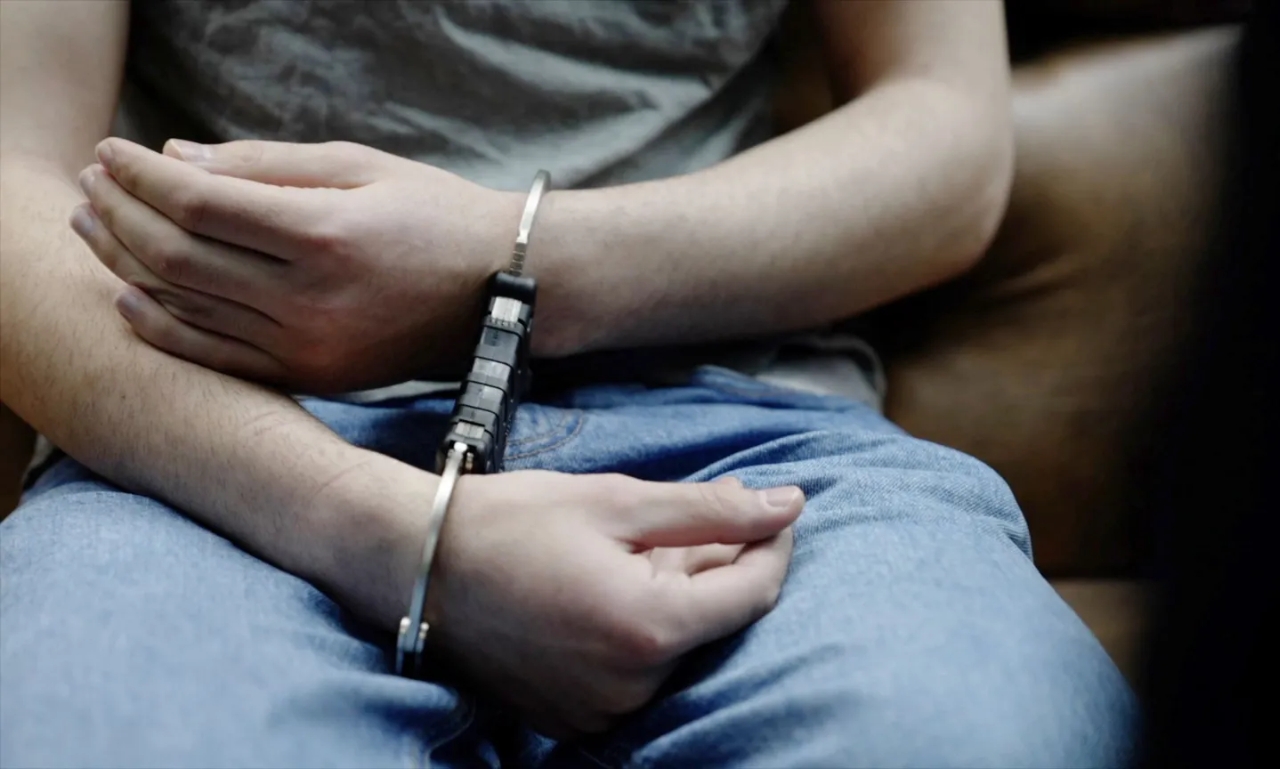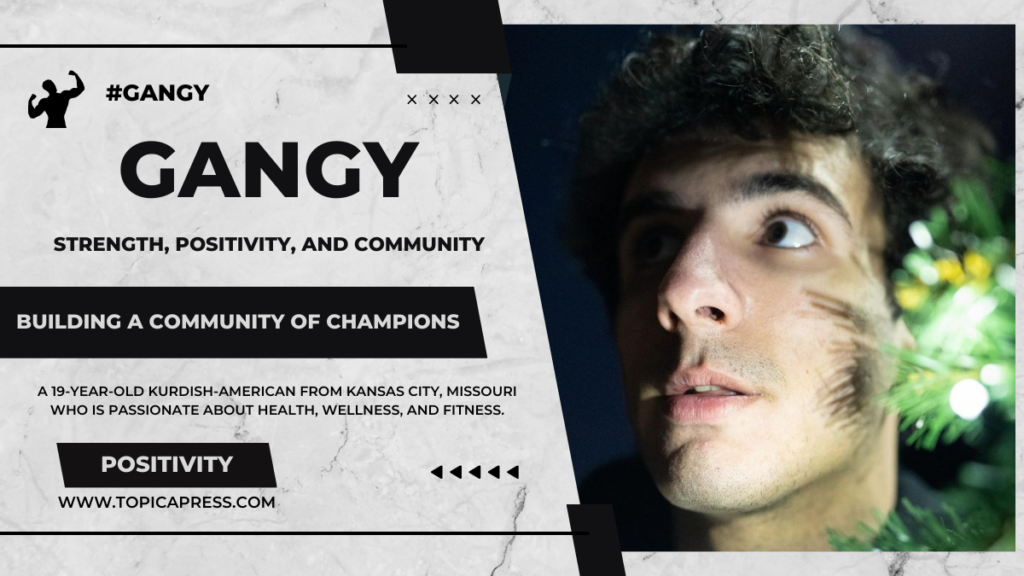A Disturbing Rise in High Street Crime
The UK’s High Streets, once symbols of community life and commerce, are increasingly becoming breeding grounds for organised crime. A sweeping law enforcement initiative, Operation Machinize, recently uncovered an alarming trend: a surge in barbershops, vape stores, and mini-marts allegedly serving as fronts for criminal activities. These businesses, operating in plain sight, are suspected of laundering money, sheltering illegal immigrants, and even participating in drug and human trafficking.
The operation was sparked by mounting intelligence and growing concerns from local residents and politicians. People noticed the unusually high number of similar-looking shops opening on the same streets—particularly barbers, vape outlets, and convenience stores—many of which appeared to have little customer traffic yet claimed to earn six-figure monthly revenues.
The National Crime Agency (NCA) took these reports seriously. They collaborated with multiple agencies, including local police, HMRC, immigration authorities, and Trading Standards, to launch Operation Machinize. The aim was to dismantle organised crime gangs exploiting High Street vacancies that surged post-pandemic.
Inside the Raids: How the Operation Was Conducted
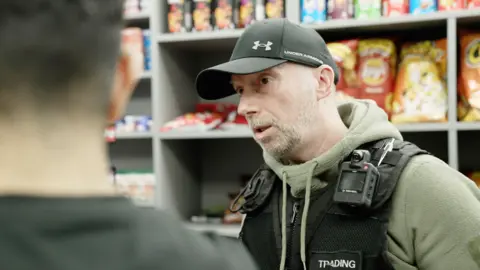
Over 265 establishments across England and Wales were targeted in coordinated raids. Cities like Rochdale, Manchester, and towns like Shrewsbury became key focus areas due to the concentration of suspicious businesses.
Warrants were executed with precision. Police used surveillance footage, hidden camera intel, and sniffer dogs to uncover illicit substances and hidden cash compartments. Uniformed and plain-clothed officers participated, often breaking down back doors and scouring flats above the shops.
Many shops were cleverly rigged with secret compartments containing thousands of pounds in cash and smuggled goods. In one Rochdale store, police uncovered hidden shelves behind counters packed with illegally imported tobacco and vapes.
Raids turned up heroin, nitrous oxide, testosterone vials, and even machetes. In Leigh, a full cannabis farm was discovered. Authorities also found living quarters for shop workers—often cramped, unhygienic rooms that suggested exploitation.
Human Element: Who Are the People Behind the Counters?
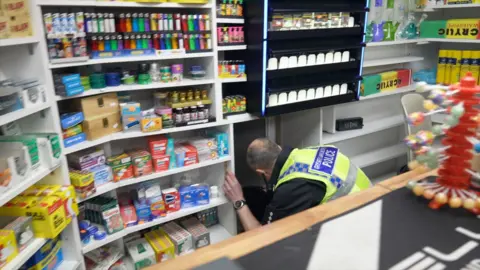
Asylum Seekers and Illegal Workers
Many individuals staffing these shops were asylum seekers from Iran, Iraq, and Kurdistan. Some had been granted temporary rights to work but were unaware of who their actual employers were, indicating a deeper network of criminal control.
Stories of Modern Slavery and Exploitation
Three potential victims of modern slavery were identified. Workers were often living above the shops in squalid conditions and working under duress. These conditions underline how organised crime intersects with human rights abuses.
Money laundering involves disguising the profits of illegal activities as legitimate earnings. Criminal gangs use these high-cash-flow businesses to ‘clean’ money through falsified sales, fake customer logs, and inflated revenue claims—some stating earnings as high as £150,000 monthly with minimal actual clientele.
In one Shrewsbury shop, police found an unpaid gas bill of £7,000 despite claimed high revenues. Banks accounts and assets worth over £1 million were frozen as part of the operation.
The influx of illegal barbershops is causing public health concerns. Fungal infections like ringworm are reportedly on the rise due to improperly sanitized tools. Gareth Penn of the Hair and Barber Council called for urgent regulation.
Local residents expressed frustration as genuine businesses struggled to compete with illicit ones that dodge taxes and rent. Legitimate shop owners are losing foot traffic, and neighborhoods feel increasingly unsafe.
There is a strong push for a formal registration system for barbershops and vape stores. Experts argue that regulation would create accountability and allow authorities to track operators more effectively.
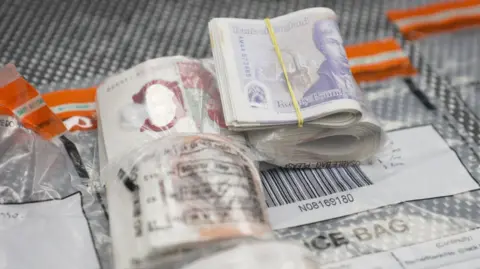
Companies House records revealed that many of these shops had rapidly changing business names, preventing consistent monitoring. Strengthening compliance checks could curb this tactic.
Despite the raids, only 10 shops were officially shut down. Many reopened within hours. This demonstrates the resilience and adaptability of criminal networks, often aided by bureaucratic hurdles.
These networks frequently change company names, ownership records, and staff, making it hard for investigators to pin down culprits. In Rochdale, Trading Standards officers observed individuals walking from shop to shop with backpacks suspected of containing contraband.
In Shrewsbury, police raided five nearby barbers. Two Kurdish asylum seekers were detained but later released. Despite claiming massive monthly income, the shop had little furnishing, indicating a façade for illicit operations.
Detectives like DI Daniel Fenn and Melanie Johnson revealed that criminals believe sleepy towns offer cover. Johnson noted that her own High Street had 10 barbers and a mini-mart—an unsustainable number by any economic standard.
Government and Public Response
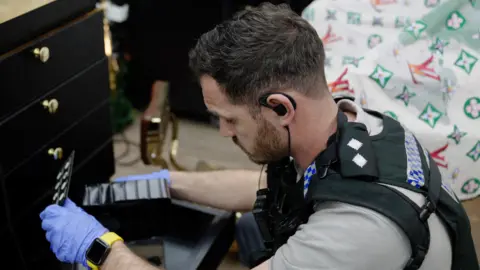
Statements from Security and Crime Officials
Security Minister Dan Jarvis emphasized that this criminal infiltration undermines community trust and national security. Authorities pledged deeper collaboration and policy reviews.
HMRC and immigration officials worked alongside police, identifying 55 illegal immigrants and freezing substantial assets. They stressed that these crimes rob communities of public funds through tax evasion.
Future of the High Street: What Comes Next?
Preventive Strategies and Surveillance
Authorities aim to implement long-term surveillance and tracking of suspicious businesses. Registration laws and licensing reforms are in the pipeline.
Building Community Trust and Transparency
Educating the public on red flags—such as unusually high turnover, lack of customers, or staff turnover—is key to preventing criminal fronts from taking root.
FAQs: Everything You Need to Know
1. What was Operation Machinize?
Operation Machinize was a coordinated law enforcement operation targeting shops suspected of money laundering and criminal activity.
2. Why are barbers and vape shops targeted?
These businesses deal in cash, making them ideal for laundering money. Many also have few real customers, raising suspicion.
3. What crimes were uncovered during the raids?
Officers found drugs, weapons, illegal tobacco, and evidence of modern slavery and immigration violations.
4. Who is behind these businesses?
Many are linked to international organised crime gangs. Staff often include asylum seekers or illegal workers.
5. What happens to the shops after a raid?
Unfortunately, many reopen quickly. Only 10 of the 265 raided shops were permanently closed.
6. How can communities protect themselves?
Support regulation, report suspicious activity, and demand transparency from local councils and law enforcement.
A Wake-Up Call for Urban Safety
The revelation that criminal gangs have infiltrated UK High Streets through everyday businesses like barbers and vape shops is deeply troubling. Operation Machinize has lifted the curtain on a silent epidemic of exploitation, fraud, and danger. While the raids marked a significant first step, the road ahead demands consistent regulation, community engagement, and political will. It’s not just about closing illegal businesses—it’s about reclaiming the safety and integrity of our streets.


